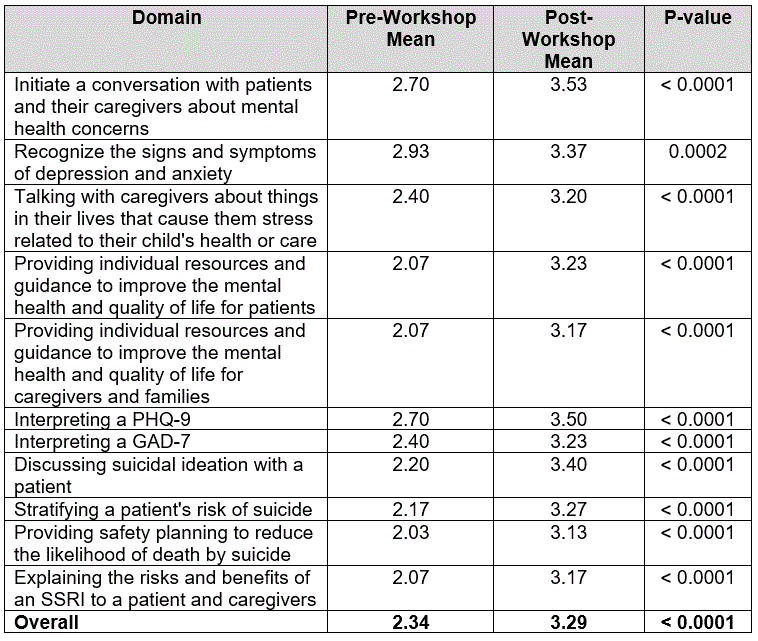Session Information
Session Type: Poster Session C
Session Time: 9:00AM-11:00AM
Background/Purpose: Many children with a rheumatic disease have concurrent mental and behavioral health challenges, but only ~40% of these symptoms are brought to medical attention. Per an American Board of Pediatrics (ABP) survey, more than 75% of pediatric rheumatology fellows believe it is important for them to address the mental health needs of their patients, but fewer than 25% feel confident in their skills to do so. Importantly, a Childhood Arthritis and Rheumatology Research Alliance (CARRA) survey demonstrated that both rheumatology patients and their parents feel most comfortable discussing their mental health concerns with their pediatric rheumatologist.
Methods: Using the ABP Roadmap Project curriculum as a framework, a 2-hour virtual mental health workshop specifically tailored to the needs of pediatric rheumatology fellows was developed and delivered as a collaboration between a child and adolescent psychiatrist and a pediatric rheumatologist. Through the workshop, participants were instructed in a strategic approach to mental health conversations, taught to utilize validated mental health screening tools, and provided guidelines on the identification of high-risk patients who need urgent mental health services. Participant confidence in addressing 11 mental healthcare domains was assessed using a retrospective pre/post survey with a 4-point Likert scale (very low to very high confidence). Descriptive statistics and a paired t-test were used in data analysis.
Results: Twenty-six of the 37 (70%) participatingpediatric rheumatology fellows completed the workshop survey, with roughly equal distribution across the three years of fellowship training (Table 1). The retrospective pre/post survey revealed a significant increase in participants’ confidence across all 11 mental health domains (Table 2). No difference was detected by postgraduate year. Pre-workshop, participants reported the least confidence in safety planning for high-risk patients (mean = 2.03), with level of confidence rising by more than 1 point post-workshop (mean = 3.13). Pre-workshop, participants reported the highest confidence in recognizing the signs and symptoms of depression and anxiety (mean = 2.93), with confidence rising to 3.37 post-workshop. Confidence scores across the 11 domains increased from 2.34 (2=low confidence) to 3.29 (3=high confidence). No participants rated their comfort level as very low for any of the 11 domains following the workshop. When asked what changes they will implement following the workshop, 60% stated they will routinely screen patients, 30% will discuss mental and emotional health with all patients, and 30% plan to explore mental health resources in their state. On a 10-point Likert scale, with 10 being extremely relevant or extremely helpful, participants rated the workshop at a relevance of 9.67 and a helpfulness of 9.33.
Conclusion: A virtual training workshop improved pediatric rheumatology fellows’ confidence in addressing the mental and emotional healthcare needs of their patients. Additional training could further foster a robust and standardized approach to assessing and addressing the mental health needs of pediatric patients with rheumatic disease.
To cite this abstract in AMA style:
Pinotti C, Manning A, Edison S, Sadun R. A Mental Health Workshop for Pediatric Rheumatology Fellows [abstract]. Arthritis Rheumatol. 2023; 75 (suppl 9). https://acrabstracts.org/abstract/a-mental-health-workshop-for-pediatric-rheumatology-fellows/. Accessed .« Back to ACR Convergence 2023
ACR Meeting Abstracts - https://acrabstracts.org/abstract/a-mental-health-workshop-for-pediatric-rheumatology-fellows/


